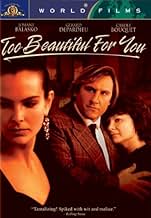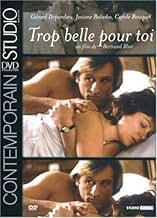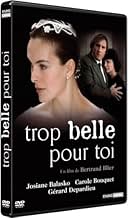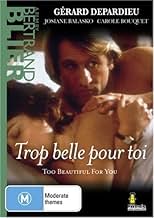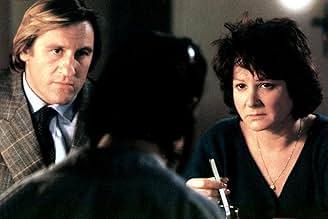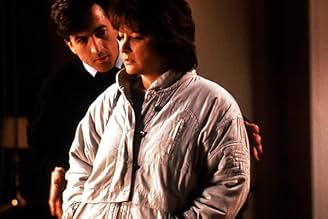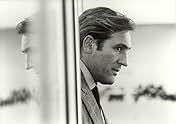CALIFICACIÓN DE IMDb
6.6/10
3.2 k
TU CALIFICACIÓN
Un triángulo amoroso intenso está formado por un acaudalado empresario.Un triángulo amoroso intenso está formado por un acaudalado empresario.Un triángulo amoroso intenso está formado por un acaudalado empresario.
- Premios
- 6 premios ganados y 7 nominaciones en total
Gérard Depardieu
- Bernard Barthélémy
- (as Gerard Depardieu)
Catherine Gillet
- La femme du train
- (sin créditos)
Sylvie Orcier
- Marie-Catherine
- (sin créditos)
- Dirección
- Guionista
- Todo el elenco y el equipo
- Producción, taquilla y más en IMDbPro
Opiniones destacadas
The few reviews here indicate that this is a film which provokes in some boredom and confusion, while other will find it provocative and daring in its originality. Maltin gives it a two-star rating and says "after a bright beginning, it goes absolutely nowhere." I was prepared to abandon the film after 15 minutes or so, but the absolutely gorgeous Schubert melodies that pervade the score and tie it all together....they kept me going with the film, and the fantastic photography, acting, and plot twists sustained my interest to the end.
Yes, the approach is surreal and the story-telling non-linear. Much of the dialog is brilliant, but it soon became obvious (to me, anyway) that these people are not actually saying these things to one another ... and what an interesting world it would be if we could say aloud all the things that we deeply feel! I cannot pretend to have understood it all, but the film had an intellectual appeal and, to repeat an earlier point, a ravishing score of Schubert pieces which adorn the film like precious jewels.
Yes, the approach is surreal and the story-telling non-linear. Much of the dialog is brilliant, but it soon became obvious (to me, anyway) that these people are not actually saying these things to one another ... and what an interesting world it would be if we could say aloud all the things that we deeply feel! I cannot pretend to have understood it all, but the film had an intellectual appeal and, to repeat an earlier point, a ravishing score of Schubert pieces which adorn the film like precious jewels.
"Elle est trop belle" is a romantic drama overflowing with a refined yet vulgar sensuality that is common in French films. Sexuality, lust, infidelity are the main themes of the film, and are lusciously exhibited on screen. Choice of music was excellent, with Schubert in the background providing beauty and consolation in midst of heightened drama. You have fancy dinners, spacious mansions and country homes. Certainly men of culture will appreciate this film.
Acting in scenes was mostly naturalistic and plain, though not completely without emotion. Overall tempo of the movie was slow and relaxed, taking plenty of time to establish scenes and characters. Sometimes even bordering on boredom. Focus was not purely based on intense emotions of infatuation and cliched notions of romanticism, but the human relationships between the characters.
The unoriginality of the subject matter and the lack of subversiveness in the message, however, dims the glow of its achievements. The sudden middle-life crisis and the marital unhappiness of a well-to-do middle class couple has been well documented in the history of film, and there have been better portrayals of it. The movie is heavy-handed with its message of internal and external beauty.
There might have been some critique of the boredom of the perfect bourgeoisie life, but it is soo brief, indirect and inconsequential you could easily miss it. It seems the down-to-earth nature and vividness of Colette is contrasted with the icy and cold demeanor of the proper Florence, and the white spacious family home with the small run-down motel.
In the end, the story felt quite simple and predictable, even cliched. While watching it for the first time was a pleasant experience, there is probably little one can gain from rewatching the film. Overall, it is a decent film, doing its job well, but nothing out of the ordinary. Though I do admire the movie in other respects, the script just doesn't make it.
Acting in scenes was mostly naturalistic and plain, though not completely without emotion. Overall tempo of the movie was slow and relaxed, taking plenty of time to establish scenes and characters. Sometimes even bordering on boredom. Focus was not purely based on intense emotions of infatuation and cliched notions of romanticism, but the human relationships between the characters.
The unoriginality of the subject matter and the lack of subversiveness in the message, however, dims the glow of its achievements. The sudden middle-life crisis and the marital unhappiness of a well-to-do middle class couple has been well documented in the history of film, and there have been better portrayals of it. The movie is heavy-handed with its message of internal and external beauty.
There might have been some critique of the boredom of the perfect bourgeoisie life, but it is soo brief, indirect and inconsequential you could easily miss it. It seems the down-to-earth nature and vividness of Colette is contrasted with the icy and cold demeanor of the proper Florence, and the white spacious family home with the small run-down motel.
In the end, the story felt quite simple and predictable, even cliched. While watching it for the first time was a pleasant experience, there is probably little one can gain from rewatching the film. Overall, it is a decent film, doing its job well, but nothing out of the ordinary. Though I do admire the movie in other respects, the script just doesn't make it.
6=G=
"To Beautiful For You" tells of a French car dealer (Depardieu) who is married to a beautiful women (Boquet) but falls in lust with his less than beautiful temp (Balasko). What follows is an affair and much discourse about same between husband and wife, wife and temp, temp and husband, and all permutations thereof as they ponder the meaning of love. The film is not for want of a good cast or production talent and earned respectable marks from critics and public alike. However, is suffers from obvious histrionics and didactics and an off-puting uneven flow which make for a less than immersing experience. TBFY has little nudity or sex but some very explicit language. Only for those into esoteric French films. (B)
I saw this film at least twice in the theaters and then again a few years later on DVD and loved it each time. To me, the reason it works so well might also be why some viewers might find it off-putting: much of what is presented on-screen is that of a subjective and unreliable narrator (Gerard Depardieu's character). Thus, scenes will often play out twice; first from the perspective of what he imagines, and then from a (possibly) more factual viewpoint. This applies to the other main characters as well, both his stunning wife and rather average secretary.
Each character in their own way sees themselves at the center of the story, though the film mostly follows the path of Depardieu. We are left to wonder why he'd embark on this affair in the first place, and though I can think of a few plausible answers, it might just be: sometimes people make choices that they themselves could not explain, but they do it anyway. As viewers, we are just there for the ride.
There is also plenty of humor throughout, both poking a little fun at the whole love triangle concept, and a range of upper middle-class conceits in addition. It's by no means a critique or polemic though; it's just that a lot of life really CAN be sort of silly if you take a few steps back. To me, the way the film is told and shot indicates that the director feels empathy for each of the three characters, and no one is entirely hero or villain. At the same time the movie might well be a commentary on the tendency of the way people go running in circles, chasing their own tale in the name of happiness. Either way, it ably straddles both the dramatic and comedic in a manner that French cinema often does better than any other.
Each character in their own way sees themselves at the center of the story, though the film mostly follows the path of Depardieu. We are left to wonder why he'd embark on this affair in the first place, and though I can think of a few plausible answers, it might just be: sometimes people make choices that they themselves could not explain, but they do it anyway. As viewers, we are just there for the ride.
There is also plenty of humor throughout, both poking a little fun at the whole love triangle concept, and a range of upper middle-class conceits in addition. It's by no means a critique or polemic though; it's just that a lot of life really CAN be sort of silly if you take a few steps back. To me, the way the film is told and shot indicates that the director feels empathy for each of the three characters, and no one is entirely hero or villain. At the same time the movie might well be a commentary on the tendency of the way people go running in circles, chasing their own tale in the name of happiness. Either way, it ably straddles both the dramatic and comedic in a manner that French cinema often does better than any other.
10Honkon
Very few directors are prepared to take the sort of liberties Blier does, both in terms of subject matter and the manner of telling the story. "Trop Belle Pour Toi" is perhaps his most accessible film, telling the story of a successful man with a beautiful wife who unaccountably falls in love with his dumpy secretary. Depardieu is wonderful in this, utterly bewildered by his predicament, and the noted comedienne Balasko is radiant as a woman in love.
The style is almost cubist, the celebrated "beginning middle and end but not necessarily in that order", and alternative storylines are proposed and discarded at whim, to the evident confusion of some viewers. Blier has often gone all out to shock but that's less evident here, however his audacious humour remains intact. Not one for the viewer who likes to sit back and be told a straight story but for the rest of us, a joy from start to finish.
The style is almost cubist, the celebrated "beginning middle and end but not necessarily in that order", and alternative storylines are proposed and discarded at whim, to the evident confusion of some viewers. Blier has often gone all out to shock but that's less evident here, however his audacious humour remains intact. Not one for the viewer who likes to sit back and be told a straight story but for the rest of us, a joy from start to finish.
¿Sabías que…?
- TriviaIn the documentary Blier, Leconte, Tavernier: trois vies de cinéma (2020), Blier says it was hell to shoot.
- Citas
Colette Chevassu: Beauty hurts.
- Bandas sonorasImpromptu Opus 90 No 2
Music by Franz Schubert
Piano: Odette Gartenlaub
édition CINE VALSE - D.D. PRODUCTIONS - ORLY FILMS -S.E.D.I.F.
Selecciones populares
Inicia sesión para calificar y agrega a la lista de videos para obtener recomendaciones personalizadas
- How long is Too Beautiful for You?Con tecnología de Alexa
Detalles
Taquilla
- Total en EE. UU. y Canadá
- USD 1,776,440
- Fin de semana de estreno en EE. UU. y Canadá
- USD 31,208
- 4 mar 1990
- Total a nivel mundial
- USD 1,776,440
- Tiempo de ejecución
- 1h 31min(91 min)
- Mezcla de sonido
- Relación de aspecto
- 2.35 : 1
Contribuir a esta página
Sugiere una edición o agrega el contenido que falta

